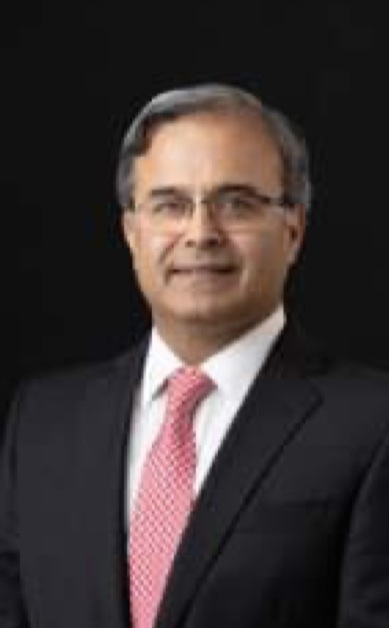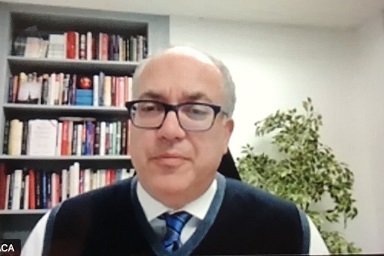Ambassador Asad Majeed Khan Offers Upbeat View of US-Pakistan Relations
By Elaine Pasquini

Washington: Dr Asad Majeed Khan, ambassador of Pakistan to the United States since January of 2019, will be leaving Washington for Brussels later this year where he will serve as Pakistan’s ambassador to the European Union.

Ambassador Asad Majeed Khan

Bill Clifford
“Serving here in Washington, DC and carrying my country’s flag has been my greatest honor and privilege,” the ambassador said on the February 22 episode of the World Affairs Councils of America’s Embassy Row Live! online program. “For any diplomat, serving as ambassador to the United States is as good as it can get in the world of diplomacy.”
Conducting the hour-long interview, Bill Clifford, president and CEO of the WACA, noted the ambassador’s appearance quite possibly drew more audience questions than any of the previous Embassy Row Live! series which features ambassadors, top diplomats and visiting dignitaries to the United States.
Many questions focused on Afghanistan since the Taliban took control of the government last summer.
While Afghanistan is experiencing a dire humanitarian crisis particularly during this severe winter, the international community has come forward in providing much-needed humanitarian assistance, Ambassador Khan noted. “But, humanitarian assistance alone will not work because unless and until we are able to help Afghanistan’s economy get back on its feet we will not be able to see long-term sustainability.”
The international community needs to work together to prevent instability, an economic meltdown and to ensure that Afghanistan is not used as a safe haven for terrorism or drug trafficking, he emphasized. “When there is peace and stability there are no safe havens. That’s where I think the regional countries and international community should work together.”
Ambassador Khan explained how Pakistan is acting as the humanitarian bridge for assistance going into Afghanistan, including from the United Nations and other sources, also noting that Pakistan has committed over $30 million for much-needed food and support for its neighbor. His country’s assistance, he stressed, “is not about the authorities in Afghanistan, it is about the Afghan people.”
Unlike some Central Asian countries that have sealed their borders, all of Pakistan’s crossing points into Afghanistan are open, Ambassador Khan said, and they have removed the tax levies and tariffs, resulting in trade expansion. “So, the long and short of it is that we are doing whatever we can to help our Afghan brothers,” he added.
Pakistan will be coordinating with the international community on the question of “recognition,” but in the meantime is “engaging” with the Taliban to prevent a worsening of the humanitarian situation, the ambassador said.
In response to a question on Pakistan’s relationship with China, the ambassador said the country has a good partnership and relationship with China “as much as we have a good and important relationship with the United States.” Pakistan has consistently maintained relationships with many countries, he said, noting that for the last 42 years Pakistan has represented Iranian interests in the United States.
Relations with India, unfortunately, “are not going anywhere,” Ambassador Khan lamented. “We’ve been making overtures…but, unfortunately, India…has not reciprocated any of those gestures.”
India’s treatment of its 220 million Muslims is of great concern to Pakistan. “For us it is deeply worrying because we have millions who still have families and relatives in India, he said. “The persecution of minorities there also provides oxygen to extremists.” The ambassador pointed out that members of the United States Congress have recently spoken out against India’s erosion of fundamental freedoms, minority rights and press freedoms.
Ambassador Khan also condemned India’s long-running illegal occupation of Kashmir. Kashmiris, he stressed, must be given the right of self-determination which has always been promised to them.
On the subject of opportunities for Pakistani women, the diplomat proudly noted the appointment of his country’s first female Supreme Court judge. Pakistan has a “vibrant female presence” in almost every sector of society, including parliamentarians, ambassadors, fighter pilots, special commandos in the police force and journalists, he said.
Regarding Pakistan’s relationship with the United States, the ambassador pointed out the US has been one of the top five investors in Pakistan for the past 75 years. “Even today, the US is our largest export destination and…either the third or fourth largest remittance provider to Pakistan.”
Pakistan’s alliance with the US is “more stable today than it was six or seven years ago,” he said. And over the last four years, the objectives of the two countries have been broadly aligned regarding Afghanistan, the ambassador continued. “The United States doesn’t want the Afghan territory to be used for terrorism against anyone and we don’t want that. The United States wants to see human rights and women’s rights and we also wish that.”
In addition, Washington and Islamabad are having dialogues on climate change, energy, health, trade, and investments, along with counterterrorism in addition to the regular military exchanges that take place between the two countries, Ambassador Khan said.
Most importantly, he expressed his gratitude to the United States for sending Pakistan nearly 57 million COVID-19 vaccine doses. “I think our COVID-19 handling has been well-managed,” he said. Out of a population of 220 million, Pakistan has administered over 209 million doses of the vaccine.
Even though the pandemic put a dent into Pakistan’s economy, the situation is turning around with exports expanding and foreign exchange reserves increasing, the ambassador said.
While Pakistan may not be an ideal democracy, the country has a vibrant media, independent judiciary and active civil society, the ambassador stated. “Pakistan’s parliament and democracy is jealously guarding its freedoms…that have been part of our political fabric.”
The United States is home to one of the largest Pakistani diaspora in the world, and, as such, plays an important role, Ambassador Khan said. “They are the most important and critical bridge between our two countries, and we should continue to rely on them.”
(Elaine Pasquini is a freelance journalist. Her reports appear in the Washington Report on Middle East Affairs and Nuze.Ink.)

